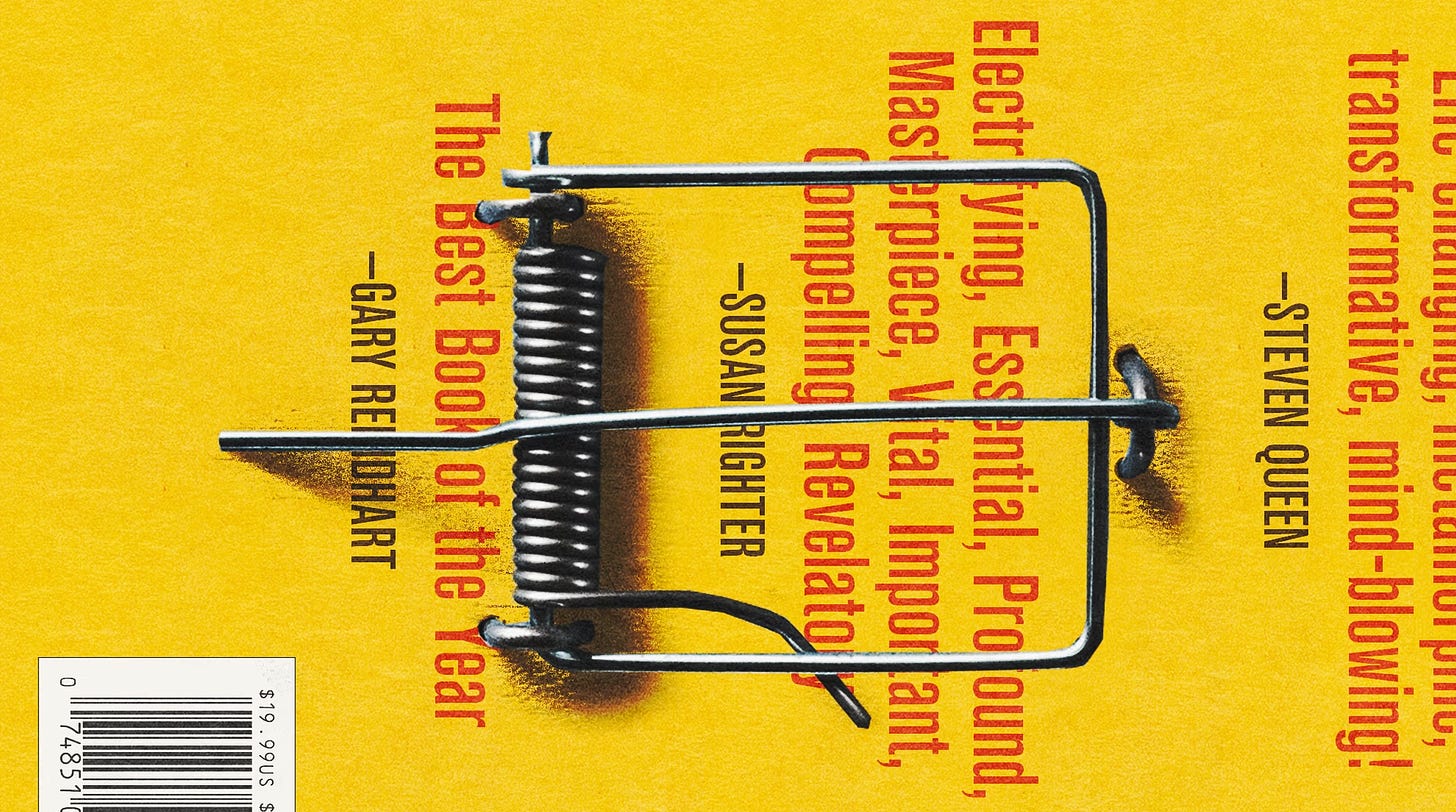Happy Friday!
Thank God August is over. (Yesterday I got my first PR email about Halloween, and I welcomed it.)
Helen
PS. Today’s Great Wives is about First Ladies. This week’s Private Eye podcast features dramatic readings from Nadine Dorries’s epic resignation letter.
The Dirty Secrets of Book Blurbs (The Atlantic)
Today, pick up any title at Barnes & Noble and you’re likely to find that it’s plastered with approving adjectives from everyone under the sun. When I asked Henry Oliver, who runs The Common Reader, a Substack devoted to literature, for examples of overused words, he sent back a long list: electrifying, essential, profound, masterpiece, vital, important, compelling, revelatory, myth-busting, masterful, elegantly written, brave, lucid and engaging, indispensable, enlightening, courageous, powerful. “We do it like some kind of sympathetic magic,” John Mitchinson, a co-founder of the book-crowdfunding platform Unbound, told me. “Like a rabbit’s foot … We all do it because we are desperate to prove the book has some merit. There is something slightly troubling about it.”
I wrote about book blurbs, in between my full-time job of being asked to provide book blurbs.
The New Old Age (The Atlantic)
One 70-year-old told me that when she retired, she learned that she’s bad at predicting what will make her happy. Many of the activities she’d planned to pursue turned out to be dull or unfulfilling. Another retiree told me that, unexpectedly, the thing he misses most about his job is the work emails—the feeling that he was inside the information flow. “It’s the recognition of loss that brings people to programs like ours,” Tom Schreier, who was the vice chairman of the investment-management firm Nuveen in Chicago and who now directs Notre Dame’s Inspired Leadership Initiative, told me. “When they ran an organization, they thought they had 200 great friends. Suddenly, only five are as responsive as they used to be.”
These folks are in the middle of what the psychologist Erik Erikson called a developmental crisis. People will either achieve generativity—a way of serving others—or sink into stagnation. At an age when you think they’d be old enough to know the answers, they find themselves thrown back into fundamental questions: Who am I? What’s my purpose? What do I really want? Do I matter?
[ . . .]
“The hard thing to do when you get old is to keep your horizons open,” the theologian and civil-rights hero Howard Thurman once wrote. “The first part of your life everything is in front of you, all your potential and promise. But over the years, you make decisions; you carve yourself into a given shape. Then the challenge is to keep discovering the green growing edge.”
My friend Laura and I have had this conversation several times before: how do you make sure that you’re as good a writer—as curious a writer—at 40 as you were at 30? Age has a deadening effect, as does experience; it makes you less strident but also more path-dependent, and less willing to believe there is anything new to be done, or any way to change the world.
For that reason, I enjoyed the stories in this David Brooks piece on high-powered retirees who go back to college and find something else to do for the rest of their lives. Some of them teach. Some of them paint. Some of them write plays for the first time. I love the idea of maintaining a “green growing edge”.
The Fight Over What’s Real On Dissociative Identity Disorder TikTok (The Verge)
[Dr Matthew A.] Robinson theorized that members of DID TikTok, and the young people being influenced by them, were exhibiting symptoms of “imitative DID,” a form of malingering where people pretend to have the dissociative disorder for attention or status. He closed his lecture with a TikTok of a system playing Guess Who? with their husband. They were using the board game to help him figure out which alter was currently “fronting,” or controlling, their system’s body. “I have a number of my own patients who I treat for DID and have always understood their experiences to be genuine,” said Robinson. “They look and act nothing like the sensationalized [social] media representations created for entertainment purposes.”
DID creators on TikTok, however, felt that Robinson was missing the point. Jenna Kraft, a 41-year-old author and host of the Gianu System, was the creator shown playing Guess Who? with her husband in Robinson’s lecture. “In the description of my videos it says, ‘this is a dramatic representation of our actual conversations,’” Kraft says. “Someone in the comments called it ‘edutainment.’”
Kraft — whose alters include JA, a man-hating lesbian, and Kaleb, a hat-loving teenage boy — says Robinson’s presentation was distressing to her system and the other influencers he featured, who faced waves of abuse off the back of his lecture. “I have screenshots of someone coming onto my page to tell someone they shouldn’t believe me because this doctor says I’m faking,” she says. “People were given a license to hate.”
The trauma physician who gave this presentation has since received a huge backlash from people on TikTok who describe themselves as “systems”—multiple identities sharing the same body. It has been so intense that other psychiatrists will not publicly engage with the suggestion that social contagion might be at work here, or that some of these systems may have diagnosed themselves with a very rare psychiatric condition on the basis of feeling different.
TikTok systems occupy an interesting place on mainstream journalism’s scepticism scale: taken more seriously than therian and otherkin, but less seriously than people who claim to have exotic gender identities. For that reason, like the TikTok tics I reported on last year—which have since largely abated—I suspect that the wave of TikTok alters will eventually subside.
Quick Links
“[Rory Stewart] started therapy ten months ago. What prompted it? “Just friends telling me it had been valuable for them.” Has he found it so? “Initially, I didn’t. But yes, I do. Every session I come away with a new thought.” Alastair Campbell, I say, is a great believer. “But he’s had a much tougher life. And with him, it’s genuinely clinical. We were in the green room in the Albert Hall, and he said in an offhand way, ‘Oh, this is where I thought about killing myself.’ ” (Campbell has said he only refrained from jumping off a balcony during a depressive episode at a Phil Collins concert because he’d crush people below.)” Janice Turner really gets Rory Stewart in this profile, I think (The Times, £)
“This is the story of the man who ‘gamed’ the lottery by buying every possible combination.” (The Hustle)
“If current trends continue, in 2038, Prime Minister Tom Harwood will be arguing with Leader of the Opposition Aaron Bastani during Prime Minister’s Metaverse Questions that there simply isn’t the money to pay for state pensions and the NHS.” James O’Malley on the natalism discourse (Odds and Ends of History, Substack)
“Vittles asks the urgent question: what if we went to Edmonton for dinner?” (New Statesman)
“‘This is a guy who pretends to be a character in The Matrix. His right-hand man pretends to be a wizard,’ Shea says. ‘They are all wearing tight-fitting shirts. I’ve asked his fans, do you ever think this is all a bit cringe?’” I talked to Matt Shea about his Andrew Tate documentary on the bonus episode of the New Gurus earlier this year (I loved it). He’s back with a followup for the BBC, which is previewed here.
See you next time!






I only have a dodgy jpeg of this old meme. Not sure where it is from.
BOOK BLURBS GLOSSARY OF TERMS
Enchanting = there's a dog in it
Heart-warming = a dog and a child
Moving = child dies
Heart-rending = dog dies
Thoughtful = mind-numbingly tedious
Haunting = set in the past
Exotic = set abroad
Audacious = set in the future
Award-winning = set in India
Perceptive = set in north London
Provocative = infuriating
Epic = editor cowed by author's reputation
From the pen of a master = same old same old
In the tradition of = shamelessly derivative
Spare and taut = under researched
Richly detailed = over-researched
Disturbing author = bonkers
Stellar author = young and photogenic
Classic author = hanging in there
Vintage author = past it
(Really enjoying Great Wives. Nancy’s astrologer was priceless. Thank you.)